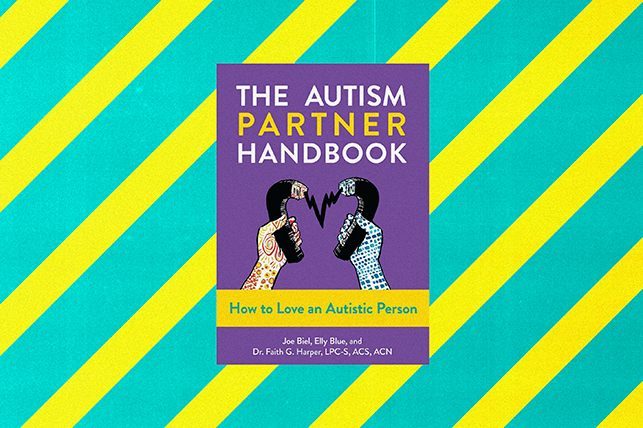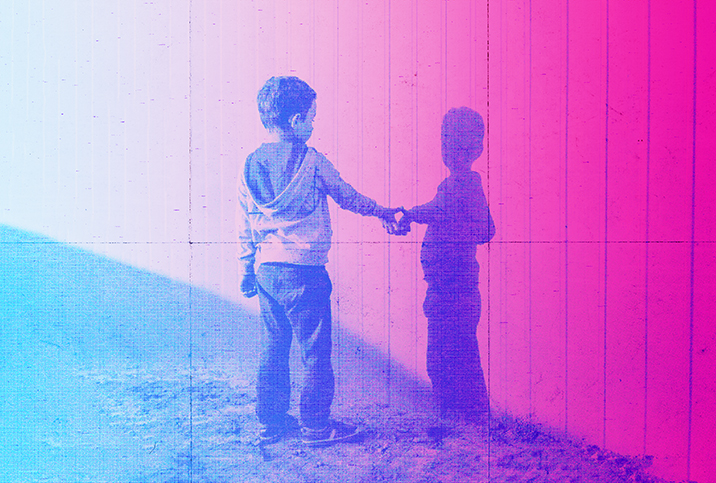Between the Pages: A 'Partner Handbook' for Loving an Autistic Person

Key Points
- This handbook provides information and guidance for anyone in a relationship with an autistic partner.
- One misconception is the belief that autistic people are intellectually disabled, whereas, in reality, autism is simply a developmental difference.
- For allistic—that is, non-autistic—individuals, it's important to have clear communication, explicit expression of intentions and understanding of the differences in social norms.
If your partner is autistic, or you think they might be, you may wonder what it means for your relationship. Fortunately, there's a helpful resource titled "The Autism Partner Handbook: How to Love An Autistic Person." Written by Joe Biel, CEO, founder and publisher of Microcosm Publishing; Elly Blue, VP, associate publisher of Microcosm Publishig and the partner of an autistic person; and Faith G. Harper, Ph.D., "The Autism Partner Handbook" provides basic information on autism, key communication tips, guidance on how to improve your sex life and more.
In this exclusive interview, Biel—who is autistic—discusses common misconceptions surrounding autism, gives some dating pointers for allistic [non-autistic] people dating autistic people and more.
Editor's note: This interview has been edited for length and clarity.
Why did you write 'The Autism Partner Handbook?'
Joe Biel: I wrote a memoir seven years ago called "Good Trouble: Building a Successful Life and Business with Autism." That was when I came out as being autistic. In my mind, the audience for that book was other autistic people because they would be the ones who would get the most out of it.
But all the fan mail came from people who were dating autistic people or who have been married to people they believed were autistic. And they had been in this relationship for like, 20 or 30 years, and the person wasn't diagnosed. They were writing to me to ask, "All right, can you help me?"
That was why we decided to write "The Autism Partner Handbook." I thought that would be a cool response. That's almost easier because this is the audience who's willing and receptive, whereas, with autistic people, there's an internalized shame. You have to get over a lot more things to get them to the point where they're like, "OK, I can manage my feelings about this."
The "Partner Handbook" was really a no-brainer. Almost immediately people would come up to me and say, "Oh yeah, that 'Partner Handbook' is the reason my partner is alive." I'd be thinking, "Oh wow, that's a better outcome than I could have ever expected or hoped for."
What are some of the most common misconceptions regarding autism?
I think the biggest one is that autistic people are intellectually disabled. Autism is thought of as a developmental difference. We're maybe not communicating in the way you would expect but we're probably operating as your equal. That, I think, is very difficult for people, especially for someone who hasn't had an autistic family member or a friend in their intimate life where they could see this. Because it's really easy to dismiss somebody based on thin judgments or thin slices of experience with them.
Similarly, people will say, "Oh, well, you can't be autistic, you express your emotions." My reaction is to think they have a lot more to learn about autism. The reality is most autistic people have emotions and often have very intense emotions.
The difference is it's harder to connect our emotions to someone else's experience. Then our expression of our emotions is usually harder for allistic people to comprehend. They're not normally operating at a sophisticated enough level to see our emotional expression. That's something that makes it more difficult to connect.
The most common misconception is someone telling me something like, "I told my partner this big, important thing and they were kind of a jerk about it." I ask them what they said exactly, and it often turns out the problem isn't what they said, it's the interpretation of an expression, or that there had been a specific expectation that wasn't fulfilled. And there wasn't the time or space to get into further understanding or interpretation before the problem arose.
Most allistic people form an experience based on how they feel rather than what happened. Whereas most autistic people can tell you exactly the words that were said and the things that happened but maybe miss all of the subtext. They're just as likely to say, "No, that's not what happened at all."
Recommended
- How to Overcome Avoidant Behavior: While it may be natural to shy away from certain situations, avoidance can be a serious problem.
- Commonly Misused Therapy Terms, Corrected by Therapists: Using these terms, even in your dating app profile, may lead to manipulation or emotional abuse.
- What Do You Think of the Trend of Older Women Dating Younger Men?: The stigma around this particular age gap is dissipating. That's a good thing.
Say an allistic person is going on a date with an autistic person for the first time. What should they keep in mind?
The biggest thing is you have to explicate exactly what you mean to an autistic person. You can't use body language or nonverbal communication to get a point across. You really have to walk up to the table and say, "Do you want to sit down?" rather than having that implied. Or [take] something that you would consider a social norm. For your autistic friend, you would have to walk through the expectations of what's going to happen next, because otherwise they're left hanging there, wondering what's going on.
That's a meeting-in-the-middle thing. That's not necessarily something one person bears the burden of. Ideally, it would be shared between the two of you.
The discomfort and awkwardness of a date can really take on new levels because it's complicated in other ways as you're both feeling each other out and seeing what feels natural. I've consulted with many people and they've told me it wasn't that their partner was insensitive. In fact, this quality was actually the thing they appreciated about them the most. That they'll always ask the question rather than assuming they'll get it wrong. They really, really try hard and want to do the right thing.
It's not to be understated, but in many ways, there's a value in making things clear for an autistic person. Say an autistic person is coming across as being selfish or talking too much, it's helpful for you to tell them that. Being silent or looking upset with mentioning it would be incredibly confusing to an autistic person.
The example I use in the book is, "How are you?" It's a completely duplicitous question because it's meaningless. Nobody actually wants to know the depths of how you're doing. And so, if you tell them, you're pretty much going to upset them in most cases. Even on a date, you want to give short answers. And you can't actually tell somebody how you're doing as the first line on the date because it just sets the tone way too much.
Human Error In Talk Therapy: A therapist's unique personality and tastes shouldn't have any bearing on the care they provide. Weird vibes? Strange turns of phrase? How to tell a therapist isn't the right fit for you.
If an allistic person is in a relationship with an autistic person and they're having some sexual difficulties. What general guidance would you have for them in approaching sex?
I think maybe you'd deal with that situation in the same way as if it were a social situation. Put the brakes on when something's not working for an autistic person or reframe the situation if that's what's needed.
It's like a lot of things in life. Most people are conditioned in some way to fulfill a role. By fulfilling that role, that's most likely a way you're not going to have an interesting or enjoyable experience because you're performing it rotely.
Whereas, I think, having sex with an autistic person, everybody's going to have a better experience if you step out of that role and more or less take charge. That's going to lead to a better experience for everybody. And it's going to mean you'll bond with this other person, which I feel is the entire point of sex.
You wouldn't have the experience simplified to just an orgasm. What you want is to have it so you can have a repeat with this person and that it's mutually beneficial.
The only way to get there is to think about what it is you appreciate about this person. Holding that and understanding that will help you to get out of any feelings of frustration or confusion in the moment. You can look at the humor of the situation, how this person is so charming and unique. I think looking on the humorous side is often the way most people get through a unique experience.


















